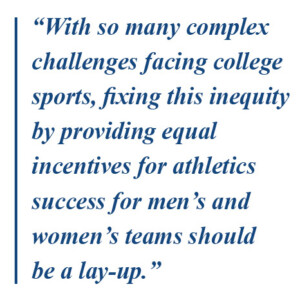
As the NCAA Division I Women’s Basketball Final Four tips off this coming weekend with record-breaking tournament viewership, it’s more important than ever for the NCAA to fix its glaring gender inequity in revenue distribution: Remarkably, the NCAA still rewards schools and conferences for tournament wins and participation for only men’s basketball teams.

The Knight Commission reiterates its call for the Division I Board to commit to gender equity in its financial incentives for athletic performance by providing equal rewards for the success of women’s and men’s teams in the March Madness tournaments. The Commission initially proposed this modification and gender equity principle in September 2021 as part of its comprehensive financial C.A.R.E. Model, which tethers athletics revenues to the educational model of college sports.
Later this month, the NCAA will distribute more than $170 million based on Division I men’s basketball teams’ wins and participation in the men’s March Madness tournament. By stark contrast, the NCAA will award $0 for the wins and participation of any women’s basketball teams.
The NCAA announced recently that it would explore awarding financial incentives for team success in the women’s March Madness basketball tournament with money from the NCAA/ESPN $920 million contract, which will take effect next year. But a more urgent and far-reaching overhaul of the NCAA plan is long overdue.
A 2021 independent gender equity report commissioned by the NCAA found the NCAA’s revenue distribution plan to be “inconsistent with the NCAA’s stated commitment to gender equity” and recommended a change. Since that time, the NCAA has awarded more than $340 million to conferences and institutions for the tournament success of men’s basketball teams over two revenue distribution cycles without any change to its discriminatory formula.
The NCAA’s apparent plan to tie future financial incentives for the women’s basketball tournament success to an assigned value in its new multisport media contract falls well short of righting this longstanding inequity. As an educational non-profit, the NCAA has one revenue distribution plan for Division I institutions—not distribution plans for each sport pegged to commercial values and media contracts. With so many complex challenges facing college sports, fixing this inequity by providing equal incentives for athletics success for men’s and women’s teams should be a lay-up.
- Full statement PDF
- Knight Commission efforts on this issue (March 2022 newsletter)
- May 16, 2022 Public Meeting: Knight Commission Calls for Major Changes to NCAA Revenue Distribution to Correct Gender and Racial Inequities
Media Contact: Amy Privette Perko, CEO, 910-551-6809
